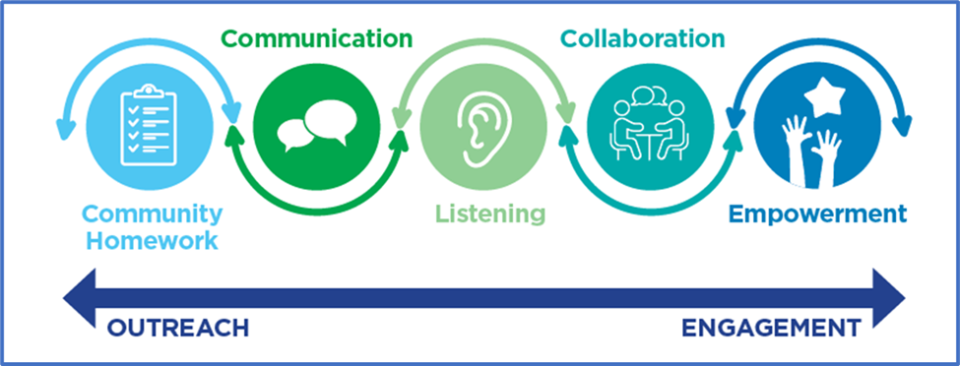Community and Partner Engagement
Purpose
Working Together for Healthier Communities
The Office of Minority Health and Health Disparities partners with various communities and partner groups, including community and faith-based organizations, legislative and policy groups and service providers across North Carolina. These partnerships are crucial to sharing health matters that are important to local communities across the state, identifying solution-seeking approaches to eliminate health disparities, making resource connections to build healthier communities and making plans for action to keep our communities healthy and safe.
Together, we share ideas, connect resources, and create solutions that help every community thrive.

This webpage will serve as a resource hub for Community and Partner Engagement, or CPE. This section aims to provide support and information to community-based organizations that work to eliminate health disparities across North Carolina.
Community and Partner Engagement Continuum
The Community and Partner Engagement (CPE) Continuum is a practical guide for building strong, lasting connections with partners and communities. It emphasizes a bi-directional approach, meaning that communication and decision-making flow both ways, giving communities a greater voice and role in shaping programs and services.
The continuum shows that engagement can begin at different phases and is not a one-size-fits-all process. Each community has unique needs, so approaches should be tailored with key elements and activities that create a strong foundation for meaningful collaboration - such as trust building, shared planning, and sustained outreach.
Key Activities of the Equitable Outreach and Engagement Continuum.

The five engagement activities in this continuum are not one-time tasks but ongoing efforts. Each activity must be revisited throughout the engagement process to ensure efforts remain responsive, adaptable, and aligned with the community’s evolving priorities. This iterative approach fosters relationships built on trust and mutual understanding, making engagement more sustainable and impactful over time.
For more information about Community Engagement or to download a copy of The NCDHHS Community and Partner Engagement Guide , visit our Department's Initiative on Community and Partner Engagement | NCDHHS.
Our Goals and Ongoing Work
Goal 1: Building Connections
We partner with community voices, including faith-based and tribal groups, local health departments, community health centers, health workers, educators, and patient navigators that serve historically marginalized populations. These relationships help us build a strong statewide resource network.
Through these connections, we not only strengthen collaboration but also share our reports and findings on health disparities. This helps communities understand current challenges and identify opportunities for meaningful action.
Goal 2: Sharing and Learning Together
We convene networking meetings for partner groups for the purpose of sharing information on best practice models for closing health gaps, emerging public health topics identifying current trends in health disparities in North Carolina, networking and giving input into the development strategies, community-based toolkit resources etc. to be used by CBOs. These network meetings include:
- HMP Connections Network Meeting (Virtual)
- Strategic Brain Trust Special Sessions
- Cafecito Spanish Language Townhall
Goal 3: Providing Resources
We develop and share clear communications, educational opportunities, newsletters and toolkits that communities can put into action. Our work also includes training and guidance to help organizations communicate effectively with people of different backgrounds and in multiple languages, ensuring information is accurate, respectful and accessible to everyone.
Goal 4: Lifting Community Voices
We foster opportunities for community-driven leadership, coordination, trusted messenger and advisors on health equity strategies, interventions, policy, systems and environmental changes.
The following are community-based and faith-based organizations that OMHHD currently partners with:
Community Level:
State Level:
- Indian Health Board
- Latin-19
- Join our bilingual Noticias newsletter
- CBO/Healthier Together Network
- CHW Association
- Tribal Leaders
- NC Care 360
The following are legislative, statewide, and policy organizations that OMHHD partners with:
- Governor's Advisory Council on Hispanic Affairs
- Legislative Black Caucus
- Andrea Harris Taskforce
- NC Commission on Indian Affairs
- NC Counts Coalition
- North Caroline Society for Public Health Educators (NC SOPHE)
- NC Wisewoman
- NC Breast and Cervical Cancer Control Program (BCCCP)
- North Carolina Advisory Committee on Cancer Coordination and Control
- NC Minority Diabetes Prevention Program (NC MDPP)
- North Carolina Department of Information Technology - Office of Digital Equity & Literacy
- North Carolina Division of Broadband & Digital Equity
- NC State Health Improvement Plan (SHIP) Community Council
- US- HHS Region 4 Health Equity Council Advisory Group
- Health and Human Services, Office of Regional Health Operations, Region 4
- State Reentry Council Collaborative - Exec. Branch Implementation Team
The following are service delivery organizations that OMHHD partners with:
- Old North State Medical Society (ONSMS) and North Carolina Community Health Center Association (NCCHCA)
- UNC Health Systems
- Duke Health Systems
All the organizations listed on this page represent a wide range of communities within North Carolina. Though there are many organizations listed, it may not cover all groups or communities that the Office of Minority Health wishes to partner with. At NCDHHS and OMHHD, we pride ourselves on being an inclusive organization where everyone’s voice is heard. We are always working to update this list and partner with as many communities and organizations as possible.
